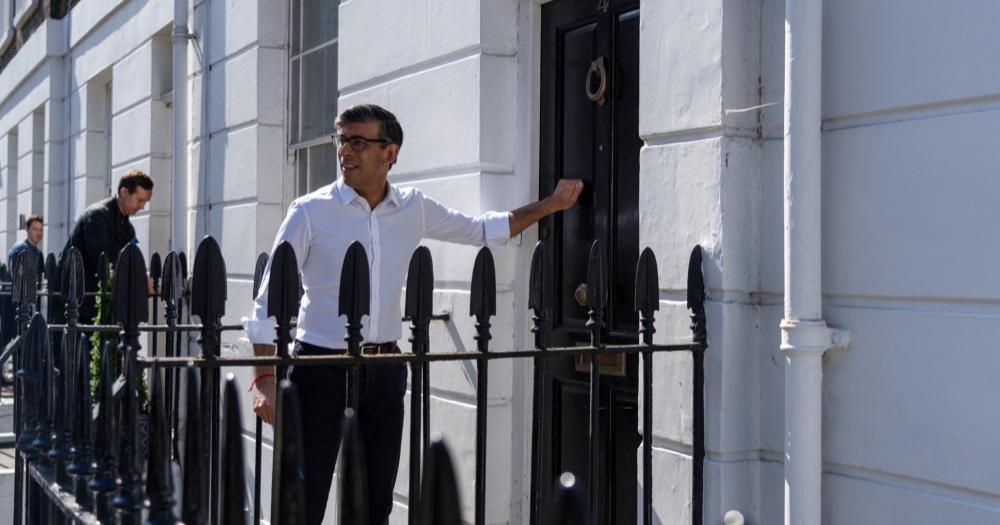'Stop our rivals forming supermajority in parliament': How did UK's ruling Conservative Party get here?
What in the crumpets is going on?

The United Kingdom is in its final week of campaigning for its Jul. 4 general election.
And one of the most surprising developments, for Singaporeans at least, is how closely one political party’s battle cry resembles that of Singapore's Workers Party (WP).
The main campaign theme? Preventing their rivals from achieving a parliamentary "supermajority".
The twist is that this call isn't coming from a British opposition party, it's coming from the governing Conservative Party instead.
Wait what?
In Singapore, a parliamentary supermajority (i.e. more than two-thirds of the seats in parliament) allows the incumbent party to change the Constitution, should it wish to do so.
For instance, Singapore's Constitution was amended in Nov. 2023 to allow elected presidents to take on international roles in their private capacities, if it's in the national interest.
WP's medium-term political goal of denying the governing People's Action Party (PAP) a parliamentary supermajority is well known and was in the limelight again recently.
Its leader Pritam Singh has explained that it would aid the party’s goals: not forming the next government, but to bring about a more "balanced" political system.
Denying this supermajority would limit the PAP's ability to amend the Constitution.
Back in the UK
The Conservative Party is making a similar argument for the current general election campaign.
It argues that a Labour Party with a supermajority in parliament would have too much power, and it would be able to pass bills without sufficient scrutiny from the opposition.
But there are significant differences.
The first is that the United Kingdom does not have a written Constitution, and a so-called "supermajority" will not confer any additional powers to a UK government.
Legally speaking, there is no difference between a party having a majority of 200 MPs and a majority of one MP. As long as a majority is reached in parliament, legislation will pass.
The second is that the Conservative Party is not an opposition party like the WP, it is the UK's incumbent government.
"The worst electoral campaign in living memory"
A Bloomberg commentary has referred to the Conservatives as the most successful political party in the world, because for well over half of its 200-year lifespan, it has been the party of government, and the main opposition at all other times.
But that same commentary also calls its current general election campaign “the worst in living memory”
The campaign is going so poorly that UK broadcaster Sky has warned that the Conservatives could end up having only about 115 out of 650 seats in parliament, the worst result in its history.
There has been mischievous speculation they might even fall below the current third place Liberal Democrat Party, meaning that they would not even be the official opposition.
While this scenario is unlikely, it is not impossible.
Labour, on the other hand, is looking at a potential victory of over 450 seats.
Expectation of victory
This has led to the Conservative defence minister, Grant Shapps, tacitly accepting that the election was lost, as reported by the BBC.
Instead, he said that the Conservative Party's objective would be to limit the scale of loss by warning that Labour might not only win, but might win so effectively as to overwhelm any opposition against it.
This position was initially rejected by incumbent prime minister Rishi Sunak, but it has appeared to become the tacit campaign position of his party.
How did the Conservatives get here
It would be shorter to describe the things that have not gone wrong for the Conservatives, both politically and policy-wise.
But it would not be easier, because it would be a struggle to find somewhere where something has not gone wrong.
Initially, the Conservatives campaigned on the basis of immigration (too much), taxes (too high),and economic growth (not enough).
But this was instantly hurled back in their faces, because of the fact that the Conservatives have enjoyed 14 years in power.
If any of these metrics were insufficient, it was either because the Conservatives had raised them, as in the case of the taxes, or had not been effectively addressing it.
And then there are the scandals.
The scandals... the scandals.
There have been over 20 by-elections in the past two years in the UK, and a significant majority have been due to either sexual or money-based scandals from the Conservative Party.
They have lost almost all of those by-elections, with some of the safest seats in the UK being overturned.
Worst yet is that the party has had three prime ministers in its past term, two who left under some kind of cloud.
Boris Johnson was forced to resign after he was caught misleading parliament and Liz Truss effectively tanked the British economy with her disastrous "mini-budget".
And Rishi Sunak is potentially the most unpopular prime minister in British history, even worse than Liz Truss, who, in case you needed reminding, failed to outlast a lettuce (a comparison which she does not think is funny).
This is before you begin to talk about water pollution, controversy around Covid public spending, and lobbying scandals.
And everything that can go wrong during the campaign has gone wrong.
Sunak’s announcement of the election itself was washed out by the rain, and it only got worse from there.
Gamblegate
But all this pales in comparison to what is now being called Gamblegate.
Several senior members of the Conservative Party, including several candidates for parliament, are being investigated for potentially using insider knowledge to place bets on the date of the election, as explained by Bloomberg.
These include the Conservative Party’s campaign director, as well as Sunak’s Parliamentary Private Secretary, the latter of which admitted placing a bet, although he denied wrongdoing.
But perhaps most damaging to Sunak's chances is that he took two weeks to suspend those implicated, which kept the scandal in national headlines for a long time.
It allowed the situation to spiral, with punditry poking holes in the Conservative position, while Labour barely had to do anything.
Does the supermajority matter?
In a word: no.
In two words… sort of.
The Conversation explains that there is no legal consequence to having a supermajority.
As mentioned, legally speaking, it does not matter whether a bill passes by a few hundred votes or by one.
However, in practical terms, having a large majority would mean that the government could afford to suffer more "rebellions" from MPs over unpopular legislation.
If the Conservatives somehow do not manage to finish second in terms of seat numbers, it would lose even more prestige and its priority to ask the government questions in parliament.
It would also hurt the party’s ability to raise funds, and lose out on public funding for researchers and staff needed to conduct parliamentary work.
In short, it would lose prominence in all areas.
This is not to mention the in-fighting that would occur as the party comes to terms with the scale of its loss.
If the UK election results are as expected, it may change the complexion of British politics for a generation.
Top image via Rishi Sunak/Facebook

MORE STORIES




















